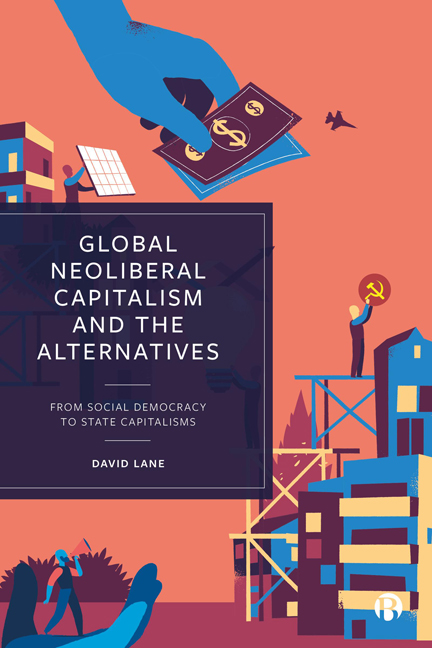Book contents
- Frontmatter
- Contents
- List of Figures, Tables and Boxes
- About the Author
- Acknowledgements
- 1 Introduction
- 2 Global Neoliberalism and What It Means
- 3 Neoliberalism: A Critique
- PART I Socialist Contenders and Their Demise
- PART II Capitalist Globalisation and Its Adversaries
- Appendix 16A Social Formations: Patterns of Coordination and Control
- Appendix 16B Regulated Market Socialism
- Index
13 - Ecological ‘Catastrophe’
Published online by Cambridge University Press: 20 January 2024
- Frontmatter
- Contents
- List of Figures, Tables and Boxes
- About the Author
- Acknowledgements
- 1 Introduction
- 2 Global Neoliberalism and What It Means
- 3 Neoliberalism: A Critique
- PART I Socialist Contenders and Their Demise
- PART II Capitalist Globalisation and Its Adversaries
- Appendix 16A Social Formations: Patterns of Coordination and Control
- Appendix 16B Regulated Market Socialism
- Index
Summary
Ecological unsustainability and environmental ‘catastrophe’ are current dilemmas leading to polarised political positions. Karl Polanyi was one of the first writers to recognise that, if unchecked, ‘leaving the fate of soil and people to the market would be tantamount to annihilating them’. While political movements can be organised to resist the actions of the market for labour, there is no comparable movement which can resist the exploitation of nature. The supremacy of human beings, enabled by the capitalist mode of production, has led to human domination over nature. Various environmental groups acting, as it were, on behalf of nature, seek to redress the balance between human beings and nature. Their objectives vary: some oppose the assumption that economic development is positive and question whether economic growth promotes human well-being; others seek to limit the harmful effects of industrialism in the exploitation of nature. The Marxist position is that the capitalist form taken by industrialisation is at fault. Environmentalists address the problem of how global capitalism can resolve the problem, or whether it should be replaced by some other form of production that would recreate a harmonious balance between mankind and nature.
The political problem is that economic and commercial activities in one country have unintended, uncontrollable and deleterious effects on a global scale. Some are confident that changes within the existing economic framework can reduce carbon emissions and thus significantly reduce the threat; others seek a more fundamental change in the basis of industrial globalisation. Ways to resolve the environmental threat depend on what activists and politicians believe to be the causes. An environmentalist approach seeks to curb the effects of the industrial revolution, which have led to the use and misuse of the Earth's resources; others attribute unsustainability not to the industrialisation process but to the rapacious nature of the capitalist form of production.
The term ‘Anthropocene’ has been coined to describe the ways that lead to breakdown of the ecological system. It refers to the impact of human activity on the planet and includes all the interacting ‘physical, chemical, biological and human processes which affect the environment’. The consequences of this rift in the Earth system threaten ‘the entire realm of human civilisation, in the sense of an advanced, ordered society, it could potentially undermine the conditions of human life itself, as well as that of innumerable other species’.
- Type
- Chapter
- Information
- Global Neoliberal Capitalism and the AlternativesFrom Social Democracy to State Capitalisms, pp. 234 - 245Publisher: Bristol University PressPrint publication year: 2023



